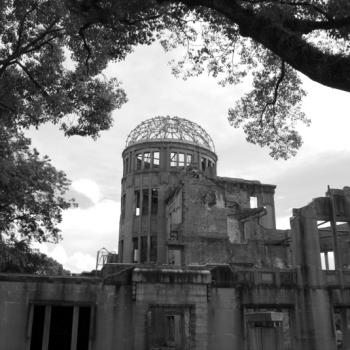Barack Obama, president of the only country that has ever used nuclear weapons in war, has called for a world free of nuclear weapons. One of the very few things I admire about Ronald Reagan was that he too abhorred nuclear weapons, and dreamed of a world without them. And now Obama has taken up the cause of abolition, committing to “seek the peace and security of a world without nuclear weapons. ” This is huge news. Surely, given Church teaching on the issue, this commitment would be applauded in Catholic circles? In fact, it was largely ignored.
Let’s do a very quick recap of Church teachingon this issue. As the Catechism notes:
Every act of war directed to the indiscriminate destruction of whole cities or vast areas with their inhabitants is a crime against God and man, which merits firm and unequivocal condemnation. A danger of modern warfare is that it provides the opportunity to those who possess modern scientific weapons especially atomic, biological, or chemical weapons – to commit such crimes.
The accumulation of arms strikes many as a paradoxically suitable way of deterring potential adversaries from war. They see it as the most effective means of ensuring peace among nations. This method of deterrence gives rise to strong moral reservations. The arms race does not ensure peace. Far from eliminating the causes of war, it risks aggravating them. Spending enormous sums to produce ever new types of weapons impedes efforts to aid needy populations; it thwarts the development of peoples. Over-armament multiplies reasons for conflict and increases the danger of escalation.
Or going back to Gaudium Et Spes (on which the Catechism draws):
“The unique hazard of modern warfare consists in this: it provides those who possess modem scientific weapons with a kind of occasion for perpetrating just such abominations; moreover, through a certain inexorable chain of events, it can catapult men into the most atrocious decisions…. the arms race in which an already considerable number of countries are engaged is not a safe way to preserve a steady peace, nor is the so-called balance resulting from this race a sure and authentic peace. Rather than being eliminated thereby, the causes of war are in danger of being gradually aggravated. While extravagant sums are being spent for the furnishing of ever new weapons, an adequate remedy cannot be provided for the multiple miseries afflicting the whole modern world. Disagreements between nations are not really and radically healed; on the contrary, they spread the infection to other parts of the earth….Therefore, we say it again: the arms race is an utterly treacherous trap for humanity, and one which ensnares the poor to an intolerable degree….”
Back in 1983, a period marked by continued cold war tensions, the United States bishops issued a brave and prophetic document —The Challenge of Peace: God’s Promise and Our Response— calling for nuclear disarmament. It recognized that deterrence could be licit, but only as an interim step on the way toward progressive disarmament. There had to be a world without nuclear weapons, as they veery existence of these weapons offends God’s creation. It is not much exaggeration to say that this document helped frame the debate, forced political leaders to focus on the just war principles, and may even have pricked Reagan’s conscience.
In retrospect, the peace pastoral appears quite restrained. Respected and orthodox moralists like Germain Grisez, Joseph Boyle, and John Finnis went further — they argued that even the nuclear deterrent is deeply immoral, on the grounds that such deterrence entails an intention to kill innocents. But today, the bishops are largely silent, and very few Catholics devote much energy to the issue. Why?
Part of it may be the inroads made by the Republican party and the broader pseudo-conservative movement with Catholics over the past quarter century — Catholics might have signed up to protect innocent human life, but got stuck with a group dedicated to American military superiority and an exponentially-expanding military budget. Not exactly the environment to push disarmament! And even if they do not support the agenda of the warrior class, they seem to have bought into the “take no prisoners” high-octane partisanship of this group. It certainly explains the completely disproportionate outbreak of “Obama derangement syndrome” that has more in common with Hannity and Limbaugh than a European or Latin American Christian Democrat. In such circumstances, his nuclear overtures merit no response.
But there’s more to it than that. I think it reflects a profound discomfort and uneasiness Americans have over the disarmament issue. After all, this is the country that not only used the weapon to kill millions, but where the justification of that act has become part of America’s national myth. We know differently. As Elizabeth Anscombe put it, with the bombing of Hiroshima and Nagasaki, “it was certainly decided to kill the innocent as a means to an end”. She has no problem dubbing Harry Truman a war criminal, a war criminal who makes Bush and Cheney took like petty street hoodlums. But Americans are unwilling to face up to that fact. Truman remains a hero — on both sides of the partisan divide.
For when we talk about disarmament, people become afraid. Afraid of the scary people out there who would do them harm in the absence of a big strong deterrent. Americans love feeling safe, and — as we have learned — will go to great lengths to restore a lost paradise. And so, surely the Church could not preach about disarmament in such a big bad world, could it? That’s so naive, so effete, so European! This attitude really sums up the American approach to Christianity, and to spiritual matters in general — whatever you do, don’t make me feel uncomfortable.
Douthat put it quite well in a somewhat different context: theological differences are “less to do with any theological principle and more to do with what aspect of American life they want God to validate.” Larison says it even better: “It is an inoffensive, undemanding Gospel, which always seems to find loopholes for our self-fulfillment rather than calling for self-denial or sacrifice of any kind, and which exists not so much to call men to repentance as to endorse choices they have already made.”
I would say that a side-effect of the “feel good” pop Gnosticism is that one is quick to denounce sins that one cannot relate to personally. Thus so many right-wing “Christians” are the first to denounce abortion, while making no attempt to understand the women living in inner-city poverty who make this awful decision. It is beyond their comprehension. They will accuse gays of destroying traditional marriage, because they are not gay themselves, while their serial adulterer friends get a free pass. And so it is with nuclear weapons — fighting for disarmament is too demanding, too hard, too disruptive for comfort. It’s too out of synch with a cozy worldview where America is always the good guy, blessed by God. Easier to bash some gays instead.












